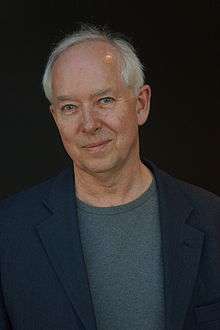Bill Manhire
| Bill Manhire | |
|---|---|
|
Bill Manhire in Frankfurt in October 2012 | |
| Born |
27 December 1946 Invercargill |
| Occupation | Poet |
| Nationality | New Zealander |
| Alma mater | |
| Spouse | Marion McLeod |
| Children | 2 |
William "Bill" Manhire, CNZM (born 27 December 1946) is a New Zealand poet, short story writer, professor, and New Zealand's inaugural Poet Laureate.
Early life
Manhire was born in Invercargill. His mother was from Scotland with a degree in science, and his father was a publican. He attended the Otago Boys' High School, and later the University of Otago in Dunedin where he received his B.A. in 1967, his M.A. (with honours) in 1968, and his M.Litt. in 1970. He went on to study at University College, London (1970–73, M.Phil) [1]
Career
Manhire has been a strong promoter of local poetry and other writing, acting as editor of several compilations of New Zealand short stories, most notably Some Other Country (1984) and Six by Six (1989). His collection of New Zealand poetry, 100 New Zealand Poems (1993), proved particularly popular, and was subsequently expanded to become 121 New Zealand Poems (2005). He also helped start the Best New Zealand Poems series, which began selecting poems in 2001.
For the 25th anniversary of the Erebus air disaster, Manhire wrote the poem "Erebus Voices", which was read by Sir Edmund Hillary at the commemorative service at Scott Base, Antarctica.
Bill Manhire currently lectures in English and creative writing at Victoria University of Wellington, where he is also the director of the International Institute of Modern Letters. Some of the work of his former students was published in the volume Mutes and Earthquakes in 1997.
His work has won the New Zealand Book Awards poetry prize five times, in 1978, 1985, 1992, 1996 and his most recent work Lifted received the 2006 Montana New Zealand Book Awards Poetry Prize.
Personal life
He is married to journalist Marion McLeod, and has two children, Vanessa and Toby, who are both journalists and writers.[2]
Awards and honours
- 1997 Appointed the inaugural New Zealand Poet Laureate for 1997-99
- 2007 Prime Minister's Awards for Literary Achievement[3]
- 2004 Recipient of the Katherine Mansfield Menton Fellowship, France[4]
Poetry collections
- 1970: Malady
- 1972: The Elaboration
- 1975: Song Cycle
- 1977: How to Take Off Your Clothes at the Picnic
- 1979: Dawn/Water
- 1982: Good Looks
- 1983: Locating the Beloved and Other Stories
- 1984: Zoetropes: Poems 1972-82
- 1990: The Old Man's Example
- 1991: Milky Way Bar
- 1996: My Sunshine
- 1996: Sheet Music: Poems 1967-1982
- 1999: What to Call Your Child
- 2001: Collected Poems
- 2005: Lifted
- 2010: The Victims of Lightning
- 2011: Making Baby Float, put to music by Norman Meehan
See also
References
- ↑ "Bill Manhire", Contemporary Poets, 7th ed. St. James Press, 2001
- ↑ Stuff.co.nz - Bill Manhire: Wizard of odes
- ↑ "Previous winners". Creative New Zealand. Retrieved October 24, 2013.
- ↑ http://www.mansfieldfellowship.org/fellows.html
Further reading
- "Pavlova and Wrists: The Poetry of Bill Manhire", by Peter Crisp, Islands 24 (Auckland), November 1978.
- "The Poetry of Bill Manhire", Hugh Lauder, in Landfall (Christchurch), September 1983.
- "Joker: Playing Poetry in the Eighties: Manhire, Curnow, Stead, Horrocks", by Michele Leggott, in World Literature Written in English (Singapore), 23(1), winter 1984.
- "Writing through the Margins: Sharon Thesen's and Bill Manhire's Apparently Lyrical Poetry" by Douglas Barbour, in Australian and New Zealand Studies in Canada (Prince George, British Columbia, Canada), 4, Fall 1990.
- "The Old Man's Example: Manhire in the Seventies" by John Newton, in Opening the Book, edited by Mark Williams and Michele Leggott, Auckland, Auckland University Press, 1995
External links
| Wikimedia Commons has media related to Bill Manhire. |
- Bill Manhire on Twitter

- New Zealand Book Council profile
- Biography on Arts Foundation of New Zealand site
- International Institute of Modern Letters
| Cultural offices | ||
|---|---|---|
| First Laureate | New Zealand Poet Laureate 1997–1999 |
Succeeded by Hone Tuwhare |
